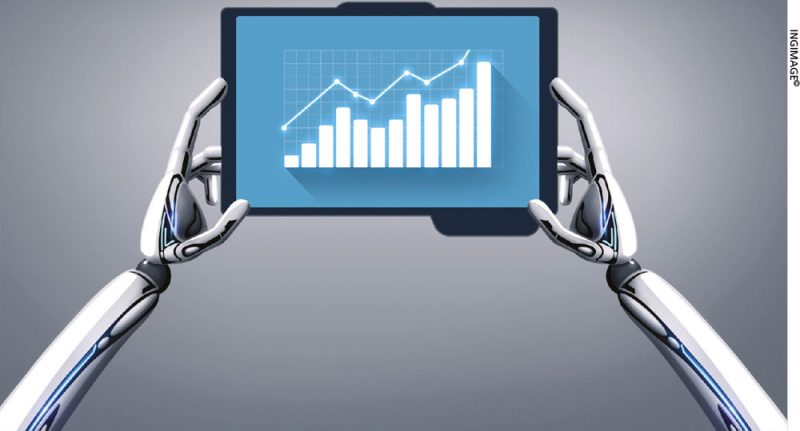ARTIFICIAL INTELLIGENCE
THE AURA OF SMART MACHINES
Suganya Manivannan examines the benefits AI brings to sales and marketing

In the latter half of the 20th century, computers changed the way industries functioned. The invention of the internet revolutionised these changes even further, greatly impacting the way in which companies conducted business.
The 21st century saw the advent of social media, and with it came significant changes in sales and marketing. And no sooner were we getting comfortable with social media marketing and sales, than a few new buzzwords have been making the rounds.
Unless you’ve been living under a rock, chances are you would have heard the terms ‘artificial intelligence’ (AI), ‘big data,’ ‘augmented reality’ and ‘virtual reality’ casually making their way into conversations these days. If predictions are accurate, the next decade or so will see AI impacting sales even more.
So what is AI, and how will it affect sales and marketing?
AI is intelligence that’s demonstrated by a non-living being such as a computer. This intelligence will use computers and machinery to perform tasks that usually require human intelligence. These tasks could include work requiring visual perception, speech recognition, decision-making or even translating text into different languages.
If this sounds like something straight out of a sci-fi movie, don’t be surprised because there’s some truth behind every movie. Although it is a relatively new concept in real life, AI has been in the works for several years.
In fact, you may have already experienced AI at work without realising it.
Did you know that voice based searches such as OK Google and the recommendation of photo tags on Facebook are all real world examples of artificial intelligence? Voice processing, image recognition and even machine learning algorithms are examples of artificial intelligence that you may have already encountered.
As AI becomes a part of daily life, there are several ways in which it will impact sales and marketing. Firstly, in the area of customer service, artificial intelligence is already encroaching on the role of salespeople.
Regardless of the industry or profession, ‘chat bots’ have become the norm for answering simple customer queries especially in the e-commerce domain. This transition will help empower customers in many respects since such AI interfaces will be able to complete most of the buying process without any human interaction.
This lack of the human touch will raise the same question that has plagued many users since online shopping gained popularity: will the lack of human interaction affect sales and eventually brand loyalty negatively?
Initially, as with the e-commerce industry, there may be some restraint in customers interacting with an AI voice but as this slowly becomes the norm, we may find that artificial intelligence can do the job far better than humans ever could.
Secondly, AI will also impact the function of the sales funnel. In the past, it was the job of marketing and sales teams to develop a symbiotic relationship, which identified and nurtured leads in the hope of customer conversion. This was definitely not a foolproof method since there were far too many steps in-between, which could result in losing the customer.
Another issue with the existing sales funnel is that sometimes, sales were offered poor leads by marketing, which made it difficult to close them. At other times, sales fell through even though marketing had provided good leads. However, with AI seeking to improve CRM systems across industries, it looks as if the gap between marketing and sales could close.
Artificial intelligence will also be able to nurture potential leads at a very early stage in the sales funnel.
This can be done through personalised pricing or even suggestions on discounts and bulk deals. It will ensure not only that high quality leads make it through the funnel but also increase the possibility of closing the leads.
These are only two ways in which we can expect artificial intelligence to impact sales and marketing in the coming years. The relevant changes have already been implemented to a certain degree, and it’s only expected to grow further as technology advances, and newer and more efficient ways of completing tasks are found.
There are still many grey areas regarding the effect artificial intelligence will have in the job market but these minor impacts have yet to pose a major threat to jobs. In the current scenario, AI is all set to improve efficiency and make work easier for the average human being.
Whether intelligent machines will eliminate human jobs remains a very real threat but development trends suggest that it may create several new avenues for work as well. No matter how it pans out, the future of AI seems very exciting!
And it is a fact of life and business that artificial intelligence is here to stay.





Have you ever thought that when you board a Swiss rail or Japanese tube train that it is powered by tools of AI?
In countries like Switzerland and Japan, the number of train journeys and to which destinations, the ticket prices on weekdays, weekends, festival seasons, and peak and off peak in terms of locals and foreigners with the exclusive customised services for tourists are decided and powered by the marvels of AI. Algorithms in AI filter out critical information through large volumes of complex data, which are crucial for pricing, product and services combinations in sales and marketing. Thereafter, such information are under the scrutiny and critical analysis of human experts in the field, prior to transforming these into decision making manoeuvres.
While online tools support customers in the early steps of purchasing, for certain types of products and services, customers still prefer a human touch towards the latter phases of their purchasing. When high priced purchases like automobiles etc. are made, people are provided with one to one personal attention of experts of the respective field. It is on the latter that they rely. Thus, a deal is closed with this personalised touch in today’s era of mass customisation.
Now, sales and marketing staff are to display newer skills – this is to please a client before they delight them. This way, they go on to clinch the deal and changing customer preferences in the present day and in future.